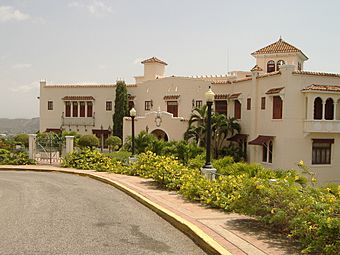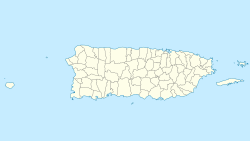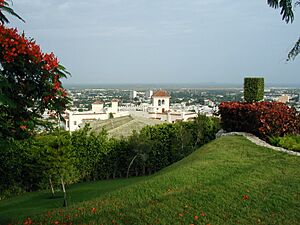Castillo Serrallés facts for kids
|
Castillo de Serralles
|
|

Castillo Serrallés in 2007
|
|
| Location | Ponce, Puerto Rico |
|---|---|
| Area | 2.5 acres (1.0 ha) |
| Built | 1930 |
| Architect | Pedro Adolfo de Castro |
| Architectural style | Spanish Colonial Revival |
| NRHP reference No. | 80004494 |
Quick facts for kids Significant dates |
|
| Added to NRHP | 3 November 1980 |
Castillo Serrallés (which means Serralles Castle in English) is a beautiful old house located in Ponce, Puerto Rico. It sits high on a hill, looking over the city. This grand home was built in the 1930s for Juan Eugenio Serrallés. His father, Juan Serrallés, started a famous company called Destilería Serrallés.
The castle is on a large property, about 2.5 acres, with very neat gardens. Today, Castillo Serrallés is a museum called Museo Castillo Serrallés. Visitors can learn about the history of sugar cane and rum in Puerto Rico. These industries were very important to the island's economy. The castle is also a popular place for special events like weddings. It was added to the National Register of Historic Places in 1980 and the Puerto Rico Register of Historic Sites and Zones in 2001. In 1996, the castle was even shown on the American TV show America's Castles.
Contents
History of Castillo Serrallés
The city of Ponce bought Castillo Serrallés from the Serrallés family. Even though the castle was worth a lot, the city bought it for a much lower price. The sale included many pieces of furniture. At first, the city wanted to turn it into a museum about Puerto Rican music. However, the Museum of Puerto Rican Music was later opened in a different location in the city.
The mansion was emptied in 1956. While the building itself stayed in good condition, the gardens became very wild. A big plan was needed to bring the beautiful grounds back to their original look. In 1980, the castle was still owned by members of the Serrallés family.
Where is Castillo Serrallés Located?
Castillo Serrallés was built on the south side of a hill called Cerro del Vigía. This hill is the closest and most noticeable hill near the historic center of Ponce. From its spot, the mansion offers amazing views of the city below. Cerro del Vigía is one of the hills north of Ponce that are part of the larger mountain range called the Cordillera Central.
The castle's location, along with its beautiful gardens and special architectural details, makes it unique among other mansions in Puerto Rico. Because it's on top of Cerro del Vigía, you can see it from almost anywhere in Ponce. It serves as a constant reminder of the city's history and heritage. The building's "Y" shape also helps it offer breathtaking views of Ponce from its eastern, southern, or western sides.
Why is Castillo Serrallés Important?
The Serrallés mansion was built for Don Juan Eugenio Serrallés, who was a leader in the sugar cane industry in the early 1900s. The building is important for both its architecture and its history.
Architectural Style of the Castle
The castle is a great example of Spanish Moroccan architecture. This style was first brought to Puerto Rico by the architect Pedro Adolfo de Castro. Other buildings in this style included El Castillo de Valdes in Mayagüez and el Castillo de Mario Mercado Montalvo in Guayanilla. Many similar mansions were built in Puerto Rico in the 1920s, but Castillo Serrallés is the best preserved one.
Historical Importance of the Mansion
Historically, the building reminds us of the big cultural and economic changes that happened in southern Puerto Rico in the 1920s. At that time, Ponce relied heavily on the sugar cane industry. This led to a lot of growth and made many families involved in the industry very wealthy. These rich families often looked to Europe for ideas on culture and style.
According to the Puerto Rico State Historic Preservation Office, European styles were often preferred in this part of the island. This strong interest in culture created jobs for artists, craftspeople, and architects. Their work helped to strengthen the local identity. Even though Castillo Serrallés isn't based on a local design, it's important because it was built to fit well with the Caribbean climate. Its craftsmanship, inside decorations, furniture, and even its layout show the cultural ideas of that time.
What Does Castillo Serrallés Look Like?
The castle was built in 1930 by a local architect named Pedro Adolfo de Castro y Besosa.
Outside the Castle
The outside of the castle features two large terraces, an outdoor fountain, and a balanced backyard garden. The building was made entirely of concrete. It was designed in a style popular in the 1920s that showed Spanish Mediterranean influences. You can see many wooden round arches over the large windows and doorways. Many of these are decorated with small stained glass pieces. Some openings also have fancy iron work. The two towers on the eastern and western sides of the building have red roof tiles. This red tile accent is also on all other rooftops. The outside walls of the building are covered in stucco.
Inside the Castle
Inside, the castle has a fancy main hall, a large dining room, and an inner courtyard. The house has four floors.
- The ground floor holds the garage and a basement used for service areas.
- The second floor has the library, a central patio, a solarium, the living room, dining room, and the kitchen.
- The third floor contains all the bedrooms.
- The fourth floor is the terrace. From here, you get the most impressive views of the city. This terrace was meant for relaxing and entertaining. It has both covered and uncovered areas, and its floor is all tiled.
To reach the main entrance on the second level, you can use one of two curved stairways. These stairs start from the covered carriage entrance on the ground level. They lead to double French doors that open into a large vestibule or reception area with a ceramic tile floor. From this room, you can see an open courtyard patio with a fountain. The formal living room is to the left of the vestibule. The living room is the only room in the castle with a parquet floor.
Castillo Serrallés in Movies
Parts of the Disney Channel original movie Princess Protection Program were filmed at Castillo Serrallés.
See also
 In Spanish: Castillo Serrallés para niños
In Spanish: Castillo Serrallés para niños
- Juan Serrallés
- Destilería Serrallés
- Don Q
- Ponce, Puerto Rico
- Casa Serrallés
 | Aaron Henry |
 | T. R. M. Howard |
 | Jesse Jackson |



